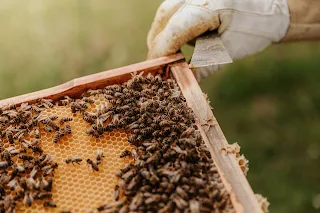Featured
- Get link
- X
- Other Apps
The Importance of Bees and their impact on the environment
The Importance of Bees and their impact on the environment
Bees are an essential part of the environment, playing a vital role in pollination and contributing to the growth of trees, flowers, and other plants. They are responsible for pollinating at least 30% of the world's crops and 90% of all plants, which require cross-pollination to spread and thrive.
Bees are the most important pollinators in Canada and are responsible for one out of every three bites of food we eat. Bees are also part of the biodiversity on which we all depend for our survival, providing high-quality food such as honey, royal jelly, and pollen, as well as other products such as beeswax, propolis, and honey bee venom.
The Importance of Bees
Pollination
Bees are the most important pollinators in the world, and their role in pollination is essential to the growth of trees, flowers, and other plants. Pollination is the process by which pollen from the male part of a flower is transferred to the female part of the same or another flower, resulting in fertilization and the production of seeds. Bees are responsible for pollinating billions of plants each year, including millions of agricultural crops. Without bees, many plants we rely on for food would die off, and our food supply would be severely impacted.
Biodiversity
As pollinators, bees play a part in every aspect of the ecosystem. They support the growth of trees, flowers, and other plants, which serve as food and shelter for creatures large and small. Bees contribute to complex, interconnected ecosystems that allow a diverse number of different species to co-exist. Bees are also an important part of the food chain, providing food for birds, mammals, and other insects.
Honey and Other Products
Bees provide high-quality food such as honey, royal jelly, and pollen, as well as other products such as beeswax, propolis, and honey bee venom. Honey is a natural sweetener that has been used for thousands of years and has many health benefits. It is rich in antioxidants and has antibacterial and anti-inflammatory properties. Royal jelly is a nutrient-rich substance that is produced by worker bees and is used to feed the queen bee. It is believed to have many health benefits, including boosting the immune system and improving skin health. Beeswax is used in many products, including candles, cosmetics, and furniture polish. Propolis is a resinous substance that bees collect from trees and is used to seal cracks and gaps in the hive. It has antibacterial and antifungal properties and is used in many natural remedies.
Economic Importance
Bees are also economically important, providing an important source of income for many rural livelihoods. According to the Food and Agriculture Organization (FAO) of the United Nations, a third of the world's food production depends on bees. Beekeeping is an important industry, providing jobs and income for many people around the world. In addition to honey, beeswax, and other products, beekeepers also provide pollination services to farmers, which is essential for the production of many crops.
Threats to Bees
Despite their importance, bees are facing many threats, including habitat loss, climate change, pesticides, and disease. Habitat loss is one of the biggest threats to bees, as many natural habitats are being destroyed or degraded due to human activities such as agriculture, urbanization, and deforestation
Climate change is also affecting bees, as changes in temperature and weather patterns can disrupt their life cycles and affect their ability to find food and shelter. Pesticides are another major threat to bees, as many pesticides are toxic to bees and can kill them or affect their ability to navigate and find food. Disease is also a significant threat to bees, as many diseases can spread quickly through bee populations and cause significant damage.
Conclusion
In conclusion, bees are essential to the environment and play a vital role in pollination, biodiversity, and the production of high-quality food and other products. Bees are also economically important, providing jobs and income for many people around the world. However, bees are facing many threats, and their populations are declining in many parts of the world. It is essential that we take steps to protect bees and their habitats, including reducing pesticide use, preserving natural habitats, and promoting sustainable beekeeping practices. By working together to protect bees, we can ensure that they continue to play a vital role in our environment and our lives.
Citations:
[1] https://www.actionnews5.com/2021/05/19/breakdown-why-bees-are-important-environment/
[2] https://www.unep.org/news-and-stories/story/why-bees-are-essential-people-and-planet
[3] https://www.pthomeandgarden.com/5-ways-bees-are-important-to-the-environment/
[4] https://royalsocietypublishing.org/doi/10.1098/rspb.2017.2140
[5] https://www.environment.sa.gov.au/goodliving/posts/2016/10/bees
[6] https://www.ncbi.nlm.nih.gov/pmc/articles/PMC8920284/
Popular Posts

Why are Memories Forgotten?
- Get link
- X
- Other Apps

How is the Colour of a Lobster Determined?
- Get link
- X
- Other Apps

Can Sound Waves Solve Plastic Pollution?
- Get link
- X
- Other Apps

Can Animals Recognise Human Faces?
- Get link
- X
- Other Apps

Is the Earth Spinning Faster?
- Get link
- X
- Other Apps

Do plants sleep? The surprising science of sleep in the plant kingdom
- Get link
- X
- Other Apps

Can Bad Times Actually Improve Your Life? Surprising Benefits of Adversity
- Get link
- X
- Other Apps

Can Brain Implants Make You More Powerful?
- Get link
- X
- Other Apps

The Future and Potential of Nuclear Batteries
- Get link
- X
- Other Apps

Could Sun Blocking be a Strategy to Combat Global Warming?
- Get link
- X
- Other Apps
Popular Posts

Why are Memories Forgotten?
- Get link
- X
- Other Apps

How is the Colour of a Lobster Determined?
- Get link
- X
- Other Apps

Can Sound Waves Solve Plastic Pollution?
- Get link
- X
- Other Apps

Can Animals Recognise Human Faces?
- Get link
- X
- Other Apps

Comments
Post a Comment